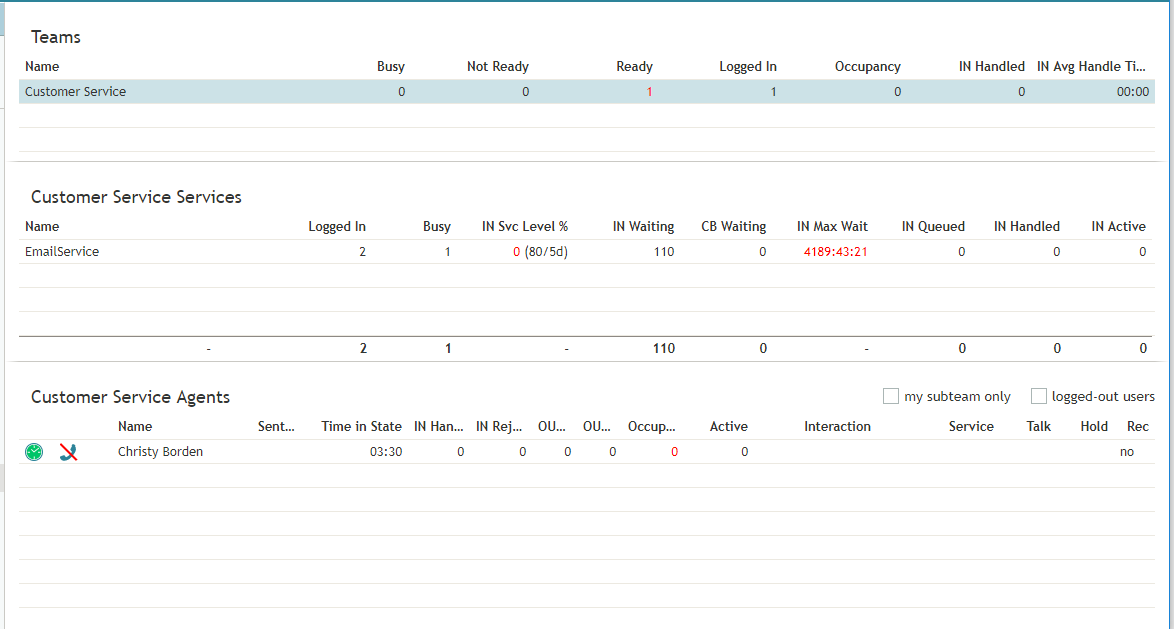Information About Real-Time Metrics

Real-time metrics are data points pulled from various areas of Agent Desktop and provide information about your team's current performance. These metrics are updated in real-time to reflect the status of your contact center operations.
| The metric refresh rate may be affected by the number of items displayed. | ||
For a complete list of real-time metrics, see List of All Real-Time Metrics.

Real-Time Metrics Categories
Real-time metrics are organized into the following categories. Please note: Some metrics fall into several categories.
Agent Metrics
Agent metrics are related to agent work and performance. Example metrics from this group include Agent Login Time and Avg Reply Time.
Campaign Metrics
Campaign metrics are related to the performance of a campaign. Example metrics from this group include Attempted and Total Completed.
List Metrics
List metrics are related to individual calling lists within campaigns and that can be displayed via Lists View. Example metrics from this group include Dialable and Total Remaining.
Service Metrics
Service metrics are for either all services assigned to a selected team or all services assigned to all teams. Example metrics from this group include Busy and IN in Progress.
Skill Metrics
Skill metrics are a subset of service metrics and are related to each individual skill within that service. Example metrics from this group include IN Active and Ready.
Team Metrics
Team metrics are related to the work and performance of a team. Example metrics from this group include Avg Handle Time and Not Ready.
Dashboard and Wallboard
Real-time metrics are also utilized in the Dashboard and Wallboard applications. For the Wallboard, metrics will appear as a shortened version of the full name; the Dashboard metrics appear as abbreviations of the metric name. For example, the metric Inbound interactions handled by agents for the day appears as Inbound handled by agents on the Wallboard but as CH on the Dashboard. The metrics on the Dashboard appear as abbreviations due to the small size of the Dashboard itself. Dashboard and Wallboard names are included in All Real-Time Metrics. For more information about these applications, see Dashboard and Wallboard.
Types of Real-Time Metrics
The system provides real-time metrics of two types: cumulative and instantaneous.
- Cumulative metrics
Cumulative metrics include all events matching the described condition since the moment within the previous 24 hours when the real-time statistics were reset according to your contact center configuration. Most of the cumulative metric names end with a verb in the perfect form and their descriptions are given in the present perfect form (e.g., IN Queued: Number of inbound interactions that have entered the service queue).
- Instantaneous metrics
Instantaneous metrics only count the resources that match the described condition at the present moment. Most of the instantaneous metric names end with an adjective or a verb in the progressive form and their descriptions usually have words current or currently (e.g., IN Waiting: Number of inbound interactions that are currently waiting in the service queue). (Compare this example to the cumulative IN Queued metric.)
Understanding Metrics Terminology
The names of many metrics have prefixes such as IN, OUT, or CB. Here is what these prefixes mean:
- Metrics whose names start with IN are related to inbound interactions.
- Metrics whose names start with OUT are related to outbound interactions. Unless explicitly stated otherwise in a metric description, these metrics count both regular outbound interactions made by agents (e.g., consult calls made with respect to inbound services) and campaign calls that may be dialed by the system and distributed to the agents when answered.
- Metrics whose names start with CB are related to inbound calls that selected the Virtual Queue option (i.e., callback requests).
For a list of other terminology used in real-time metrics and their definitions, see Glossary.